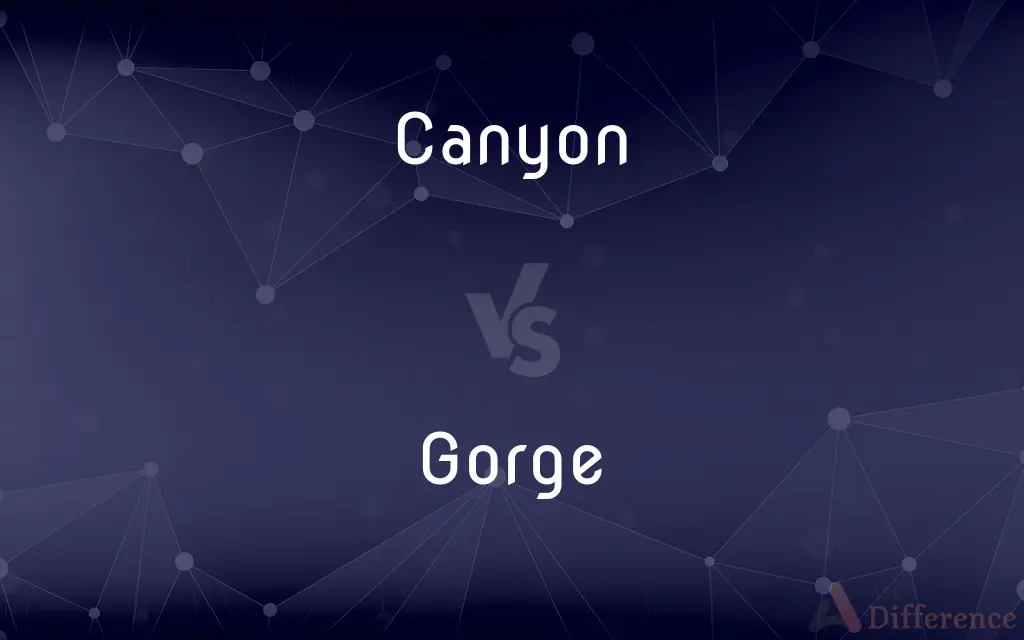Canyon vs. Gorge — What's the Difference?
Edited by Tayyaba Rehman — By Fiza Rafique — Updated on October 5, 2023
A canyon is a deep, elongated valley with steep sides carved by erosion, usually by river action. A gorge is a narrow valley with steep, rocky walls, especially one through which a river runs.

Difference Between Canyon and Gorge
Table of Contents
ADVERTISEMENT
Key Differences
Canyons and gorges both refer to deep ravines or valleys formed primarily by the erosive action of water. While both share similarities, they have distinguishing features that set them apart. A canyon typically presents as a broad and deep valley with steep sides, often carved out by a river over millions of years. They can span vast distances and are sometimes found in arid desert landscapes where flash floods have cut into the bedrock over time.
On the other hand, a gorge is usually more narrow and is characterized by its steep, almost vertical walls. Gorges often appear as if they've been sliced into the landscape, creating a dramatic chasm. They are typically shorter than canyons and are found where rivers or streams have eroded the land quickly, often due to a sudden change in elevation.
One way to differentiate the two is by looking at their width relative to their depth. Canyons, like the Grand Canyon in Arizona, tend to be wider, allowing for a river and sometimes even a floodplain within them. Gorges, such as the Taroko Gorge in Taiwan, are more constricted, with the river taking up most of the valley floor.
The terms canyon and gorge are sometimes used interchangeably in everyday language, and the distinction might vary based on regional preferences. For instance, what is called a canyon in the U.S. might be referred to as a gorge in the U.K. Regardless of the terminology, both represent the powerful erosive forces of water over time.
In essence, while canyons and gorges are both deep valleys carved by water, they differ in width, depth, and often the environment in which they are found. Both, however, stand as testament to the dynamic and transformative power of nature.
ADVERTISEMENT
Comparison Chart
Definition
Deep valley with steep sides, usually broad.
Narrow valley with steep walls, typically rocky.
Width relative to depth
Generally wider relative to its depth.
More narrow and constricted.
Formation
Formed over millions of years by river erosion.
Quickly formed, often due to elevation changes.
Example
Grand Canyon in Arizona.
Taroko Gorge in Taiwan.
Landscape
Often found in arid regions, spanning vast distances.
Typically shorter, with the river occupying most of it.
Compare with Definitions
Canyon
A deep, broad valley with steep sides.
The Grand Canyon's vast expanse is a sight to behold.
Gorge
A deep ravine, often formed by a river or stream.
The waterfalls cascading into the gorge created a mesmerizing view.
Canyon
A large chasm with cliffs or steep sides.
Canyons are often popular spots for hiking and sightseeing.
Gorge
A tight passage between high cliffs or mountains.
The train track went right through the heart of the gorge.
Canyon
A ravine formed by erosion, often by river action.
Over time, the river carved a deep canyon into the landscape.
Gorge
A narrow valley between hills or mountains, typically with steep rocky walls and a stream running through it.
Canyon
An extensive gap in landscapes, primarily resulting from water erosion.
The colors of the rock layers in the canyon tell a story of geological history.
Gorge
The throat.
Canyon
A deep gorge typically larger and broader than other ravines.
The echo in the canyon was amplified due to its depth and shape.
Gorge
A narrow rear entrance to a bastion, outwork, or other fortification.
Canyon
A canyon (from Spanish: cañón; archaic British English spelling: cañon) or gorge is a deep cleft between escarpments or cliffs resulting from weathering and the erosive activity of a river over geologic time scales. Rivers have a natural tendency to cut through underlying surfaces, eventually wearing away rock layers as sediments are removed downstream.
Gorge
A mass of ice obstructing a narrow passage, especially a river.
Canyon
A deep gorge, typically one with a river flowing through it, as found in North America
The Grand Canyon
Gorge
Eat a large amount greedily; fill oneself with food
They gorged themselves on Cornish cream teas
Canyon
A narrow chasm with steep cliff walls, cut into the earth by running water; a gorge.
Gorge
A deep narrow valley with steep rocky sides; a ravine.
Canyon
A valley, especially a long, narrow, steep valley, cut in rock by a river.
Gorge
A narrow entrance into the outwork of a fortification.
Canyon
The English form of the Spanish word Cañon.
Gorge
The throat; the gullet
The gory sight made my gorge rise.
Canyon
A ravine formed by a river in an area with little rainfall
Gorge
The crop of a hawk.
Gorge
An instance of gluttonous eating.
Gorge
The contents of the stomach; something swallowed.
Gorge
A mass obstructing a narrow passage
A shipping lane blocked by an ice gorge.
Gorge
The seam on the front of a coat or jacket where the lapel and the collar are joined.
Gorge
To stuff with food; glut
Gorged themselves with candy.
Gorge
To devour greedily.
Gorge
To eat gluttonously.
Gorge
(archaic) The front aspect of the neck; the outside of the throat.
Gorge
The inside of the throat; the esophagus, the gullet; the crop or gizzard of a hawk.
Gorge
Food that has been taken into the gullet or the stomach, particularly if it is regurgitated or vomited out.
Gorge
(US) A choking or filling of a channel or passage by an obstruction; the obstruction itself.
An ice gorge in a river
Gorge
(architectural element) A concave moulding; a cavetto.
Gorge
The rearward side of an outwork, a bastion, or a fort, often open, or not protected against artillery; a narrow entry passage into the outwork of an enclosed fortification.
Gorge
(fishing) A primitive device used instead of a hook to catch fish, consisting of an object that is easy to swallow but difficult to eject or loosen, such as a piece of bone or stone pointed at each end and attached in the middle to a line.
Gorge
(geography) A deep, narrow passage with steep, rocky sides, particularly one with a stream running through it; a ravine.
Gorge
(mechanical engineering) The groove of a pulley.
Gorge
An act of gorging.
Gorge
To stuff the gorge or gullet with food; to eat greedily and in large quantities. on
They gorged themselves on chocolate and cake.
Gorge
(transitive) To swallow, especially with greediness, or in large mouthfuls or quantities.
Gorge
(transitive) To fill up to the throat; to glut, to satiate.
Gorge
(transitive) To fill up (an organ, a vein, etc.); to block up or obstruct; of ice: to choke or fill a channel or passage, causing an obstruction.
Gorge
(slang) Gorgeous.
Oh, look at him: isn’t he gorge?
Gorge
The throat; the gullet; the canal by which food passes to the stomach.
Wherewith he gripped her gorge with so great pain.
Now, how abhorred! . . . my gorge rises at it.
Gorge
A narrow passage or entrance
Gorge
That which is gorged or swallowed, especially by a hawk or other fowl.
And all the way, most like a brutish beast,e spewed up his gorge, that all did him detest.
Gorge
A filling or choking of a passage or channel by an obstruction; as, an ice gorge in a river.
Gorge
A concave molding; a cavetto.
Gorge
The groove of a pulley.
Gorge
A primitive device used instead of a fishhook, consisting of an object easy to be swallowed but difficult to be ejected or loosened, as a piece of bone or stone pointed at each end and attached in the middle to a line.
Gorge
To swallow; especially, to swallow with greediness, or in large mouthfuls or quantities.
The fish has gorged the hook.
Gorge
To glut; to fill up to the throat; to satiate.
The giant gorged with flesh.
Gorge with my blood thy barbarous appetite.
Gorge
To eat greedily and to satiety.
Gorge
A deep ravine (usually with a river running through it)
Gorge
A narrow pass (especially one between mountains)
Gorge
The passage between the pharynx and the stomach
Gorge
Overeat or eat immodestly; make a pig of oneself;
She stuffed herself at the dinner
The kids binged on icecream
Gorge
A narrow valley with steep rocky walls.
The river rushed through the gorge, its sound echoing off the walls.
Gorge
A chasm with near-vertical sides.
The sheer walls of the gorge were a challenge for rock climbers.
Gorge
A narrow cut in the land, usually containing a river.
The gorge was filled with the sounds of birds and rushing water.
Common Curiosities
Which is deeper, a canyon or gorge?
Both can be deep, but gorges are typically more narrow relative to their depth than canyons.
Is every canyon a gorge?
Not necessarily. While all gorges can be considered canyons due to their depth, not all canyons are gorges because of their breadth.
Can humans create canyons or gorges?
While humans can create deep excavations, natural canyons and gorges are formed by geological processes over time.
Are there canyons underwater?
Yes, there are underwater canyons, often deeper and larger than those on land.
How does vegetation in a canyon differ from a gorge?
Vegetation varies based on the region, but canyons, being broader, might support a wider variety of plants than the narrower confines of a gorge.
Are gorges shorter than canyons?
Generally, gorges are shorter and more constricted than canyons.
Can you find wildlife in a gorge?
Absolutely, many gorges have ecosystems that support a variety of wildlife.
How do the shapes of canyons and gorges differ?
Canyons are typically wider and can have a U or V shape, while gorges are narrower and often V-shaped.
Can gorges and canyons flood?
Yes, both can flood, especially during heavy rainfall or sudden snowmelt.
How are canyons formed?
Canyons are primarily formed by the erosive action of rivers over millions of years.
What's the most famous canyon in the world?
The Grand Canyon in Arizona is arguably the most famous canyon globally.
Do canyons only form in specific regions?
No, canyons can form anywhere, provided there's consistent water flow and erodible rock.
Are there tours available for exploring gorges?
Yes, many gorges worldwide offer tours, both for sightseeing and adventure activities.
Can gorges be found in deserts?
Yes, gorges can form in various landscapes, including deserts, where flash floods can erode the land quickly.
Is rock climbing popular in canyons and gorges?
Yes, both canyons and gorges with suitable rock formations are popular among rock climbers.
Share Your Discovery

Previous Comparison
Wafer vs. Waffle
Next Comparison
Downright vs. UprightAuthor Spotlight
Written by
Fiza RafiqueFiza Rafique is a skilled content writer at AskDifference.com, where she meticulously refines and enhances written pieces. Drawing from her vast editorial expertise, Fiza ensures clarity, accuracy, and precision in every article. Passionate about language, she continually seeks to elevate the quality of content for readers worldwide.
Edited by
Tayyaba RehmanTayyaba Rehman is a distinguished writer, currently serving as a primary contributor to askdifference.com. As a researcher in semantics and etymology, Tayyaba's passion for the complexity of languages and their distinctions has found a perfect home on the platform. Tayyaba delves into the intricacies of language, distinguishing between commonly confused words and phrases, thereby providing clarity for readers worldwide.
















































